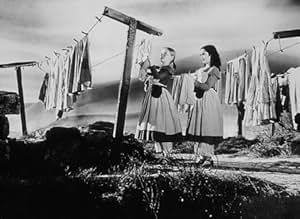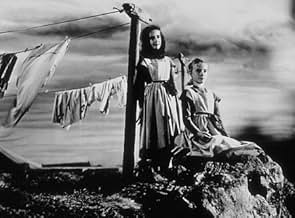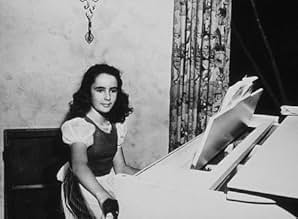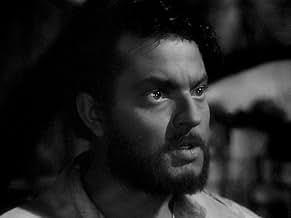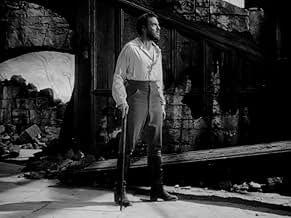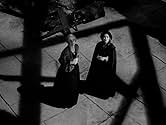Depois de uma infância difícil, a órfã Jane Eyre é contratada por Edward Rochester, o taciturno senhor de uma misteriosa mansão, para cuidar de sua filha.Depois de uma infância difícil, a órfã Jane Eyre é contratada por Edward Rochester, o taciturno senhor de uma misteriosa mansão, para cuidar de sua filha.Depois de uma infância difícil, a órfã Jane Eyre é contratada por Edward Rochester, o taciturno senhor de uma misteriosa mansão, para cuidar de sua filha.
- Direção
- Roteiristas
- Artistas
- Prêmios
- 3 vitórias no total
- Mason
- (não creditado)
- Guard
- (não creditado)
- Bookie
- (não creditado)
- Townsman
- (não creditado)
- Woman at Party
- (não creditado)
- Proprietor
- (não creditado)
Avaliações em destaque
It's hard to describe which is the most jaw-dropping surprise in this movie: the Kane-esque gothic expressionism of the cinematography, or the stunning acting performances. Welles plays probably the most romantic leading role of his career as the brooding Rochester, while Fontaine postively glows in an understated turn as the title character. Of particular note are two child actors: Peggy Ann Garner, as the young Jane, who has a brief but dazzling turn to open the picture, and who was better known shortly thereafter for her lead in A Tree Grows in Brooklyn; and the never-yet-equaled Margaret O'Brien, the oscar-winner who played 'Tootie' in 'Meet Me in St. Louis' as Rochester's ward and Jane's charge. Oh, and nearly incidentally, one of Elizabeth Taylor's first performances, as Jane's doomed friend Helen.
One can only speculate how the history of film would've been different had Welles somehow started a trend in Hollywood story-telling like that of this rendition of 'Jane Eyre'. He certainly had enough classics pitched in his early and still hopeful days in Hollywood, and this film, whether or not he deserve direct credit for it, is one of the strongest -- and, despite the pacing, most concise -- retellings of a literary classic in film history. Without too much hyperbole, it's as if Charlotte Brontë were on the level of Shakespeare and Fontaine and Welles forgotten archetypes of deep myth. It's not a stretch to say that this film version is far more accessible to the modern sensibility than the book itself is, without losing the period feel and contemporary feeling of the original text.
8/10, a forgotten classic.
Yet when it's not reminding us that it's at heart a version of something else, it's a very good film, falling not too far short of David Lean's "Oliver Twist" - which it resembles. Both films were shot almost entirely in the studio, yet don't feel studio-bound; they feel rather as though the directors had managed to find unusually claustrophobic out-of-door (or, in Lean's case, urban) locations. In both films a portion of every frame is consumed by impenetrable shadow. (Yet "Eyre" is detailed, and makes the best possible use of every frame.) Both films take place around in a callous England of the 1920s. (I got the impression that if Brönte's characters had for some reason gone to London they would have encountered Dickens's, although this impression was destroyed when the rich Londoners visit Rochester's castle.) Both films manage to be sentimental in an agreeable way. Both have excellent musical scores. In fact, this may be Herrmann's best score of the 1940s, certainly better than the one he wrote for "Citizen Kane", which is seems better than it is because the film as a whole is a masterpiece.
If you can, make sure you see a print with a pristine soundtrack. Orson Welles isn't always easy to understand.
Under Robert Stevenson's direction Fontaine/Welles seem to capture the essence of two abused outsiders resisting their attraction for one another, trying to adhere to convention. A strong supporting cast. There are brief though memorable appearances by Agnes Moorehead, Elizabeth Taylor and Peggy Ann Garner as "young" Jane.
George Barnes' camera captures appropriately stark images of Ross Dowd and Thomas Little's sets. Charlotte Bronte's grim novel is well suited to the excellent B/W, cinematography: a memorable scene early in the film has young Jane being punished by being forced to stand on a stool that is nearly in the center of a fan of shadows cast by the stair railing, It is almost reminiscent of expressionist German films of the Weimar years.
The film manages to entertain as well as inform. Purists may object to the last 3 lines of the film which hint at a slightly happier denouement than the book offered. In spite of that, Jane Eyre is still a nearly flawless film.
I had previously reviewed a 1934 version that starred Virginia Bruce and Colin Clive had done for Monogram. And as befit that studio the budget for the project was pretty anemic. And no one could possibly have believed the glamorous Ms. Bruce could be a plain Jane.
Also Joan Fontaine fresh off her Oscar for Suspicion was a far better actress. Fontaine has played glamor roles, but she dialed down the surface beauty to give a finely etched performance as the shy young thing brought up in cruelty by her aunt Agnes Moorehead and schoolmaster Henry Daniell in the institutional school she is sent.
Fontaine is great, but she is also building on the performance of Peggy Ann Garner as the young Jane Eyre who has enough resiliency to overcome a really horrible childhood. In many ways the Garner/Fontaine character of Jane Eyre echo how Joan's sister Olivia DeHavilland as Catherine Sloper was brought up in The Heiress. The miracle is that Jane Eyre doesn't become as twisted as Catherine Sloper.
Orson Welles with his stage training and magnificent voice and pieces of subtlety in his manner scores well as Mr. Rochester who carries a secret tragedy within him. He engages Fontaine to be governess for his 'ward' Margaret O'Brien and love cannot take its course because of some really big barriers. What they are you have to see Jane Eyre for.
I'm sure that 20th Century Fox must have had Suspicion in mind when casting Joan Fontaine. In both films she goes off to live in a big estate a bit apprehensive about what she's getting into. And in both films she has reason to be apprehensive.
One young actress who received no billing, but got real notice was eleven year old Elizabeth Taylor. She plays Peggy Ann Garner's friend in Henry Daniell's school and her death scene must have not left a dry eye in any theater Jane Eyre was playing.
This version of Jane Eyre sets a very high standard for those before or since to follow.
Você sabia?
- CuriosidadesAfter securing the screen rights, David O. Selznick originally approached Orson Welles to play the role of Rochester opposite Selznick contractee Joan Fontaine. He got Aldous Huxley, John Houseman, and Robert Stevenson involved. Ultimately though, he sold the package to Darryl F. Zanuck and Twentieth Century Fox.
- Erros de gravaçãoThe text of "Jane Eyre, Chapter 1" that appears on screen does not correspond to the text of Bronte's novel. Chapter 1 actually opens, "There was no possibility of taking a walk that day. We had been wandering, indeed, in the leafless shrubbery an hour in the morning; but since dinner (Mrs. Reed, when there was no company, dined early) the cold winter wind had brought with it clouds so sombre, and a rain so penetrating, that further out-door exercise was now out of the question."
- Citações
[first lines]
Jane Eyre: [narrating] My name is Jane Eyre... I was born in 1820, a harsh time of change in England. Money and position seemed all that mattered. Charity was a cold and disagreeable word. Religion too often wore a mask of bigotry and cruelty. There was no proper place for the poor or the unfortunate. I had no father or mother, brother or sister. As a child I lived with my aunt, Mrs. Reed of Gateshead Hall. I do not remember that she ever spoke one kind word to me.
- Versões alternativasThere is an Italian edition of this film on DVD, distributed by DNA srl, "JANE EYRE (1943) + LETTER FROM AN UNKNOWN WOMAN (1948)" (2 Films on a single DVD), re-edited with the contribution of film historian Riccardo Cusin. This version is also available for streaming on some platforms.
- ConexõesFeatured in AFI Life Achievement Award: A Tribute to Orson Welles (1975)
Principais escolhas
Detalhes
- Data de lançamento
- País de origem
- Central de atendimento oficial
- Idioma
- Também conhecido como
- Alma rebelde
- Locações de filme
- Empresa de produção
- Consulte mais créditos da empresa na IMDbPro
Bilheteria
- Orçamento
- US$ 1.705.000 (estimativa)
- Tempo de duração1 hora 37 minutos
- Cor
- Proporção
- 1.37 : 1
Contribua para esta página



